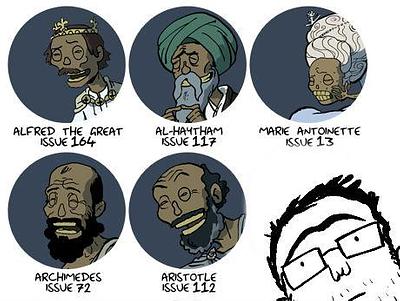Looking for all Articles by Adam Murphy?
Getting started on creating comics
Glasgow-based comics artist, writer and illustrator Adam Murphy stops interviewing the dead for a moment to share his top five tips for getting started in creating comics.

Learn to draw!
This might seem obvious, or, to people who are hoping to write comics for others to draw, irrelevant. But even if another artist is going to do the final artwork, the understanding of visual language which comes from drawing is essential to telling stories in a visual medium. I recommend a serious daily practice of drawing from life, combined with careful study of somebody like Andrew Loomis, who teaches drawing fundamentals. This is how I learned to draw: drawing people and places every day during my lunch breaks and practicing from Loomis in the evenings. Don't worry about "finding your style" -- that comes later. Just make sure that your understanding of basic drawing -- anatomy, perspective, the body in motion, facial expressions etc. -- is strong.
Make lots of comics!
Similarly, this might seem obvious or irrelevant, but I think it's of profound importance. Whether you are planning a massive graphic novel or a short comic, it's your intuitive understanding of the medium that determines how well it will work. I kept a daily diary comic for about 4 years, and it was one of the best learning exercises I have tried. It doesn't have to be a diary, but the format provides several important exercises: Doing something every day. Breaking down the complex flow of time into individual moments. Awareness and attention to the world. Developing a robust, confident, quick drawing style. Practice drawing real things. Learn to do it quickly and move on; not everything needs to be perfect, or even very good, it just has to get done.
Define your parameters
Once you are confident with drawing and comics and feel ready to start on a larger project, think about your parameters. Page size, panel size, text size, and page extent are all absolute boundaries. For Corpse Talk I have particularly tight parameters: to tell the entire story of a person's life in two pages! This has required a number of adaptations, smaller panels, for example, and I can't do long, silent, mood-sequences! But the parameters also give life and purpose to the work.
Since it is primarily intended for kids, I have had to develop a funny, light tone, even when dealing with serious or grisly details. But also, I have to think constantly about the sorts of questions kids would ask, which prompts me to dig deeper and think more about the meaning of events of the past than otherwise. Even the whole concept of the strip came from fighting with the iron grip of parameters. Originally it was to be about modern famous people, which I realized was likely to get me sued, so the fact that they had to all be dead people became a parameter which, combined with the need to make it appealing to kids, gave the zombie-interview format I have used ever since. This is not an idea I would have ever come up with left to my own devices, and yet it's worked amazingly well, so parameters can be your friends!
Use the grammar of comics
Comics have their own unique grammar, which is different, although related, to that of film or other visual media. The sequencing of images is the most fundamental element of comics -- which images you choose to show and which to leave out, the speed of images, etc. But also of huge importance is the page turn. Unlike with prose, the reader will likely take in a full-page spread in one go, then read the details, so make sure any important reveals happen immediately after a page turn. Reading direction, cinematographic framing, interplay of text and image, sound effects all have their own grammar and historical development, and their careful and informed use makes a huge difference to the reading experience. Scott McCloud is very good for this sort of stuff, as is Will Eisner, but it takes practice to know how to use these techniques and wed them to your creative process (see item 2!)
Do the work
It may sound frustrating or discouraging, but I think it's actually quite heartening to know that there is no shortcut to success. People don't really "break in" to comics -- it's a hard job to make a living at and should really only be approached with the goal of doing it for love. That said, it is possible to get better with dedication and hard work, and good work does have a market (albeit a small one, but things are hopefully growing...) Don't worry too much about "making it" -- that will take care of itself. Just do the work, put it out there, and hope.